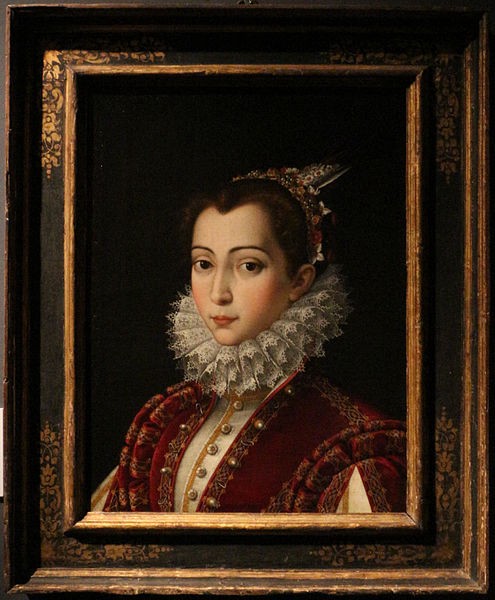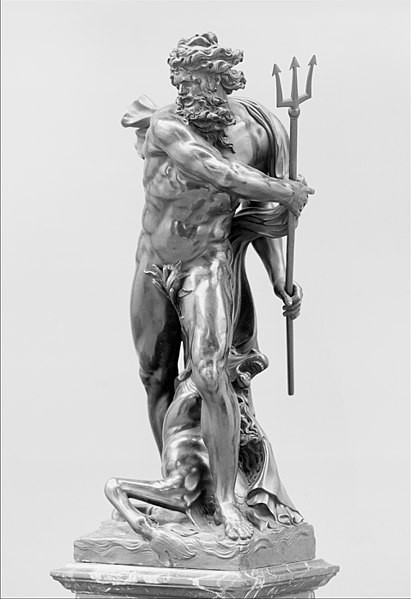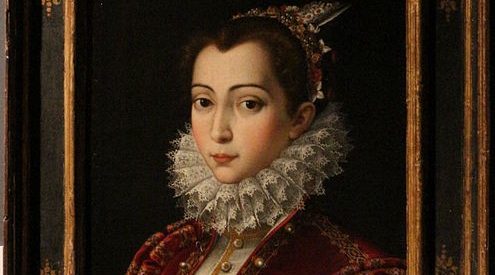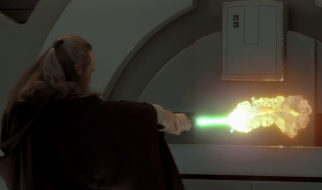This is such an intense poem! It?s full of dark undertones and psychological manipulation. Though the language is difficult at first, don?t let that put you off ? if you can get past the vocabulary, you?ll start to enjoy it as much as you?d love a crime, thriller or horror show on netflix. I?ve tailored this analysis towards AQA and Edexcel exam boards (it?s in the GCSE / IGCSE Poetry Anthology for both), but it?s suitable for anyone studying the poem at any level and also fits with other exam boards too, such as CIE / Cambridge, WJEC/ Eduqas, CCEA, OCR and more.
Thanks for reading! If you found this resource useful, you can view our full Edexcel poetry course here: https://scrbbly.teachable.com/p/edexcel-igcse-poetry
You can also download this resource as a printable document here: https://www.tes.com/uploader/v2/12242638/preview
 Italian Renaissance painting of a Duchess by Scipione Pulzone
Italian Renaissance painting of a Duchess by Scipione Pulzone
THE POEM
My Last Duchess
FERRARA
That?s my last Duchess painted on the wall,
Looking as if she were alive. I call
That piece a wonder, now; Fra Pandolf?s hands
Worked busily a day, and there she stands.
Will?t please you sit and look at her? I said
?Fra Pandolf? by design, for never read
Strangers like you that pictured countenance,
The depth and passion of its earnest glance,
But to myself they turned (since none puts by
The curtain I have drawn for you, but I)
And seemed as they would ask me, if they durst,
How such a glance came there; so, not the first
Are you to turn and ask thus. Sir, ?twas not
Her husband?s presence only, called that spot
Of joy into the Duchess? cheek; perhaps
Fra Pandolf chanced to say, ?Her mantle laps
Over my lady?s wrist too much,? or ?Paint
Must never hope to reproduce the faint
Half-flush that dies along her throat.? Such stuff
Was courtesy, she thought, and cause enough
For calling up that spot of joy. She had
A heart ? how shall I say? ? too soon made glad,
Too easily impressed; she liked whate?er
She looked on, and her looks went everywhere.
Sir, ?twas all one! My favour at her breast,
The dropping of the daylight in the West,
The bough of cherries some officious fool
Broke in the orchard for her, the white mule
She rode with round the terrace ? all and each
Would draw from her alike the approving speech,
Or blush, at least. She thanked men ? good! but thanked
Somehow ? I know not how ? as if she ranked
My gift of a nine-hundred-years-old name
With anybody?s gift. Who?d stoop to blame
This sort of trifling? Even had you skill
In speech ? which I have not ? to make your will
Quite clear to such an one, and say, ?Just this
Or that in you disgusts me; here you miss,
Or there exceed the mark? ? and if she let
Herself be lessoned so, nor plainly set
Her wits to yours, forsooth, and made excuse ?
E?en then would be some stooping; and I choose
Never to stoop. Oh, sir, she smiled, no doubt,
Whene?er I passed her; but who passed without
Much the same smile? This grew; I gave commands;
Then all smiles stopped together. There she stands
As if alive. Will?t please you rise? We?ll meet
The company below, then. I repeat,
The Count your master?s known munificence
Is ample warrant that no just pretense
Of mine for dowry will be disallowed;
Though his fair daughter?s self, as I avowed
At starting, is my object. Nay, we?ll go
Together down, sir. Notice Neptune, though,
Taming a sea-horse, thought a rarity,
Which Claus of Innsbruck cast in bronze for me!
Robert Browning
VOCABULARY
Countenance ? Face /facial expression / appearance
If they durst ? If they dare
Mantle ? Medieval robe
Courtesy ? Politeness / obeying rules ? archaic ? curtsy
Bough ? Thick tree branch
Officious ? Being confrontational, trying to assert authority or dominance
Mule ? Donkey
Stoop ? Bend low
Trifling ? Unimportant / not serious
Wits ? Intelligence / mindset
Munificence ? Generosity / giving out wealth
Pretense ? When someone is pretense / a fake reason for something
Avowed ? Admit / promise / publicly state
A rarity ? Something that is very rare
Dowry ? Money given from the wife?s family to her husband
STORY
We?re looking at the portrait of the last duchess, painted and hanging on the wall ? the Duke of Ferrara says she looks like she?s alive, so we know she died. The Duke it talking to an envoy ? a messenger / servant of a low class position; he has decided to show him around his private art gallery. He says it?s an amazing painting, a ?wonder?. The painter ? Fra Pandolf ? worked hard on it for a day and now it?s complete. The Duke is speaking to an envoy of his new wife-to-be?s family, and he asks if he wants to sit and look at the painting. The Duke says he called it a ?Fra Pandolf? painting because some strangers look at it and start to question how lifelike the woman seems, ?the depth and passion? of her expression look so intense and realistic (a suggestion that she had perhaps flirted with the painter).
The Duke says these strangers ask about the painting because he is the only one who can show it to them. We realise that the envoy has also asked about her expression. The Duke says it wasn?t only her husband that made her look so attractive ? he lists the attractive parts of her: the blush in her cheeks, her wrists, her throat. He says that she was too easily pleased by the attention of others, and she liked everything, and she was interested in everything and everyone (not only the Duke, as he seems to have wanted). He says it was all the same to her ? she loved his attention, the daylight fading, a gift of cherries from a man, riding her white horse around the castle grounds ? all these things brought the same look of pleasure to her face. It was fine for her to be grateful to other men, he says, but he was annoyed that she treated them in the same way she treated him ? as if his ?gift? of an ancient aristocratic name was only as good as their gifts.
The Duke says even if he was skilled at talking, it wouldn?t have been worth speaking his mind to her and letting her know that ?this disgusts me? or ?you went too far?. Even if he had done this and she had listened, it would have still been ?stooping? on his part ? i.e. lowering himself to her level. She smiled when he passed her, but she also smiled at everyone else. He gave orders and the smiles stopped ? this suggests that he ordered her to be killed.
The poem switches back to focusing on the painting, where the Duchess looks like she?s still alive. There?s a shift in tone as the Duke asks the envoy to leave. We realise that the Count is downstairs, and the envoy works for him. They are arranging a payment (dowry) for the Count?s daughter, who will soon be married to the Duke and become the new Duchess. On the way out the Duke asks the envoy to look at a bronze sculpture of Neptune taming a seahorse.
 Bronze Sculpture of Neptune
Bronze Sculpture of Neptune
SPEAKER/VOICE
- The Duke (Duke Alfonso of Ferrara) is the speaker in the poem.
- We know that he?s been married at least once before, and that his wife died ? by the end it is suggested that he killed her.
- As the poem progresses we start by thinking he?s upset by his wife?s death and is trying to commemorate her; by the end we realise he is not a nice person and that he killed her we switch from sympathy to shock and disgust.
- He is unphased by her death and is already remarrying.
- His words are cold, practical and superior.
- His cool manner when speaking about his last wife suggests that he is comfortable with death and murder, and as he is speaking to the envoy of his new wife it presents a threat to her that she will also be killed if she doesn?t behave as he wishes.
- The other voices in the poem are silent ? the envoy listens and sometimes asks short questions, be we don?t know exactly what he asks ? we assume he speaks and responds, but the Duke clearly dominates the conversation ? he uses his power and status to gain control.
LANGUAGE
- Rhetorical Question ? ?Will?t please you sit and look at her?? / ?Will?t please you rise?? > The Duke asks seemingly friendly questions but these are also kind of a command given the context of the envoy?s status being much lower than the Duke, the questions create a cyclical structure.
- First person singular pronoun ? ?The curtain I have drawn for you, but I)? > extremely controlling, power play / dominance / shows self obsession ? singular pronoun, he never says ?we?, always ?I? and ?my? vs ?she?, showing their separation
- Foreshadowing ? ?Half-flush that dies along her throat.? > Foreshadows her death, but also provocative.
- Repetition:?stoop? is repeated three times.
- ??spot of joy? or ?spot / Of joy?is also repeated.
- ?Fra Pandolf? is repeated ? he?s an extremely famous painter so it shows his wealth and status / and his obsessiveness and superiority.
- Simile ? ?looking as if she were alive?
- Third person pronoun ? ?she? is repeated, almost in a bitter tone to show the Duke?s anger (we?re not given her real name, she is just called the ?Last Duchess? ? her title).
- Possessive pronoun ? ?my? ? Shows his fixation on possessing the Duchess, how he views his wife as his property (a common belief at the time), he treats her as he treats his other works of art, demonstrating a materialistic attitude ? interestingly, he is irritated by her refusal to be ?his?, to dedicate herself completely to him.
- Metaphor / Symbol ? ?Neptune .. Taming a seahorse? ? suggests he views himself in the position of a God, that nature bends to his will, a symbol of masculinity and virility, whereas the seahorse is beautiful but powerless.
- Middle English phrasing ? Gives a feeling of authenticity of the time period e.g. ?will?t please you?.
- Synecdoche ? ?her looks went everywhere?.
STRUCTURE/FORM
Cyclical structure: The poem starts and ends with a command from the Duke.
Punctuation:
- Parenthesis ? ?(since none puts by / The curtain I have drawn for you, but I)? ? This line is enclosed in brackets, imitating the way in which the painting is enclosed by the curtain.
- Dashes ? ?Even had you skill / In speech ? which I have not ? ? ? Shows a slight digression in which the Duke attempts to be self deprecating, it?s an example of verbal irony given that he is speaking so much without giving the envoy any time to reply, so he must really view himself as skilled in speech.
- Caesura ? ?This grew; I gave commands; / Then all smiles stopped together.? ? The two semicolons in this quotation create dramatic pauses, increasing suspense for the audience. The first gives us pause to reflect on how the Duke became increasingly angered by the Duchess?s behaviour, and the second creates a frightening pause where we wonder what his commands were. The sibilant phrase ?all smiles stopped? euphemistically lets us know that his commands were to have her killed. The cold and unemotional delivery of this line confirms our suspicions about the Duke?s psychopathic behaviour, and shifts the tone (volta) to become quite frightening and menacing ? we are afraid of his power and obsessive control.
Single stanza: One long stanza shows the Duke?s dominance over the envoy and environment, his need to control everything around him.
Dramatic monologue: Written from the point of view of a character, as if it?s a speech in a play.
Speaker: Duke of Ferrara
Addressee: Envoy, servant sent to negotiate the terms of the new marriage to the new duchess, takes him on a tour of his art collection
Starts in medias res: In the middle of things, so the reader feels displaced.
CONTEXT
- Setting ? Ferrara, Italy, Renaissance period (1561)
- Narrator ? Duke Alfonso II of Ferrara, whose young wife Lucrezia Medici died under suspicious circumstances ? suspected poisoning (married at 14, dead by 17) ? he was married three times.
- After her death, Alfonso courted and married another woman
- Browning loved the Medieval period and lived in Florence, Italy during the Victorian era (1812?1889).
- Fra Pandolf ? A fictional painter, the name ?Fra? means ?Brother? so it shows that he was a monk. He was commissioned by the Duke to paint the woman (likely based on Fra Lippo Lippi ? a very famous monk painter whose work can be seen in the Uffizi Gallery. He also had an affair with one of his portrait models)
- The Victorian attitude to mourning was very different from Renaissance Italy ? Victorians would have been shocked that the Duke had moved on so quickly from his dead wife and paid her no respect by not mourning her properly.
THEMES
- Psychology
- Jealousy
- Suspicion
- Control
- Faithfulness
- Murder
- Aristocracy
- Psychology
- Power
- Manipulation
- Art / Beauty
Thanks for reading! If you found this resource useful, you can view our full Edexcel poetry course here: https://scrbbly.teachable.com/p/edexcel-igcse-poetry
You can also download this resource as a printable document here: https://www.tes.com/uploader/v2/12242638/preview


